The Mississippi Petrified Forest tells the state’s story from a unique, natural perspective.
Located off Highway 49 in Flora, just outside the capital city of Jackson, the petrified forest is the only one of its kind in the southeastern U.S. The registered national forest gives folks an opportunity to enjoy the outdoors and learn more about the natural history of Mississippi.
History
The existence of Mississippi’s petrified forest has been known since the mid-1800s, but only within the past four decades has it been developed and opened for public exploration. R.J. “Bob” and Shirl Schabilion acquired the petrified forest in August 1962 and opened it to the public one year later.

Archaeologists believe that around 36 million years ago, a roaring, thunderous, flood-swollen river snatched everything in its path. Flowing southward, the waters ripped and tore at the once magnificent trees. With the abating of the earth-changing force, the battered remnants of the trees finally began to sink, settling deeper into the watery ooze. Each fresh flood from the north brought more sand and silt to cover the central Mississippi trees. This continued for years upon years, ever more deeply burying the old trees. The trees slowly began to decay. The petrifaction process, turning once living trees into stone logs then began.
Time moved forward to the age of the glaciers. As the glaciers pushed forward they crushed everything in their path. A gradual melting began to take place and the water carried the finely ground glacial dust with it. The dust was eventually left on the flood plains. With little or no vegetation to hold the soil as it dried, winds began to pick up the fine dust particles.
Gigantic dust clouds were formed, becoming tremendous choking dust storms. These winds carried tons of this dust to the area where the stone logs lay buried far underground. As the winds died down, the particles of glacial dust were dropped to the earth. When the dust storms were over, the land above the logs had a mantle of fine tan-colored soil over it. The great stone logs were to rest secure for more than one thousand years. Grass, bushes, and trees then rose and grew in the soils laid down by the dust storms above the logs.
Erosion began in the tan-colored soil. The wind and the rain combined to nibble away at the soil. With each passing storm, more soil was washed away until small gullies began to appear. Over the years, the wind and rain have enlarged the gullies until they widened and deepened into ravines. When the wind-blown soil had all been eroded and washed into the foot of the ravines, the elements began eating away at the lower layer, the reddish sands and silts of the Forest Hill formation, in which the old trees had become petrified or turned to stone.
The raindrops prodded out the grains of sand until some of the stone logs became visible. Many had been broken into large pieces by the sheer weight of the deep, heavy layers of earth that rested on them. As the engulfing sands had been moved away from them, log sections tumbled down into the ravines revealing what is seen at the present-day Mississippi Petrified Forest.
The size of the petrified logs in the forest indicates that as living trees, these stone giants were over one hundred feet tall, and perhaps one thousand or more years old.
Nature Trail
What other way to explore this natural phenomenon first-hand than a nature trail? A trail guide ushers visitors along the pathway at each point of interest. As folks move along the trail, they begin to see the story of the Mississippi Petrified Forest unfold. Beholding all of the natural beauty surrounding the trail, and hearing the sounds of nature, guests will always be near the huge logs that lie right next to the trail, some close enough to touch — to feel the ruggedness of stone where there was once bark of a living tree.
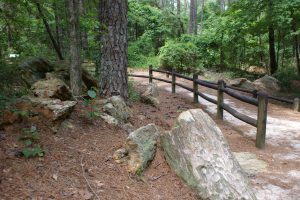
The most photographed log at the outdoor attraction is the “Caveman’s Bench,” which lies right along the forest trail where the eroding sands had placed it. In the old piece of canyon wall beside the trail bench lies multiple log sections still embedded, which were once all part of the same huge tree. The stone logs give spectators a glimpse into prehistoric times.
Museum
For those looking to take a deeper dive into the scientific element of the Mississippi Petrified Forest, the Earth Science Museum contains a large map with examples of petrified wood found in every state, with foreign petrified wood is represented as well. Plant life through the ages is identified by a variety of leaves, fruits, cones, and bark. There are also fossil woods identified by species. Many other kinds of fossils are on display — dinosaur footprints, whale bones, turtle shells, and others including the complete cast of a prehistoric camel.
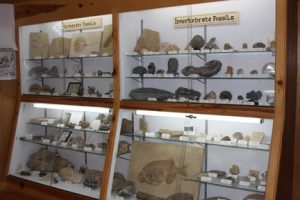
Gem Mining Flume
Visitors seeking an interactive experience can enjoy a round of flume mining — playing in a pool of water to try to find a gem. Partakers will start with a bag of “mine muck,” the proper term for rocks out of the mines, and search for real gems. Any rock or gem found by a participant can be kept. Mississippi Petrified Forest experts believe flume mining is an effective way for one to start a rock collection while learning the identifications of numerous gems and minerals.

Campground
Campers are invited to enjoy an after-hours experience at the petrified forest. The park features a campground hosting 11 full hook-up RV campsites with water, sewer, and electric services. A tent camping area including four sites with water and electricity is onsite. The camper’s zone is a secluded wooded area offering peace and quiet in a natural setting. Showers and restrooms are located in the campground area as well as a dump station.
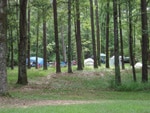
Pavilion
The latest addition to the central Mississippi attraction is a large covered pavilion with lights, water, and electricity. The structure is available for rent for activities such as family gatherings, company picnics, birthday parties, weddings, or any special event and can accommodate large groups. The park area by the pavilion provides a natural environment for visitors to soak up the scenery and beauty of the forest.
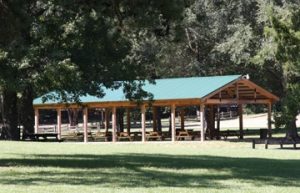
Gift shop
To round out a trip at the Mississippi Petrified Forest, guests are invited to visit the gift shop where they can purchase a petrified wood souvenir to remember a journey through time. The gift shop is filled with gem and mineral items from the state and other parts of the world. Gemstone jewelry, much of it being handmade, is also available for purchase.
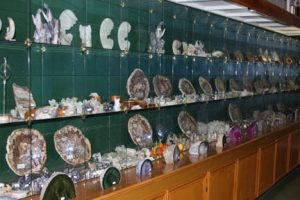
Admission
The attraction is open year-round with hours differing in the first half of the year and the back end of the year. From April 1 through Labor Day, the petrified forest is open from 9 a.m. to 6 p.m. daily. From the day after Labor Day to March 31, visitors can explore the outdoor attraction from 9 a.m. to 5 p.m. The nature trail closes one hour before guests have to leave the venue. The cost of admission is $7 for adults, $6 for students and seniors, and $5 each for groups of 15 or more. An additional $4 plus tax is tacked onto a gem mining ticket.
Pets are welcome as long as they are on a leash.
The above article is one of eight stories that will be presented by SuperTalk Mississippi News throughout the summer months, highlighting some of the “gems” that make Mississippi a great place to live, work, and play.
The post Summer spotlight: Petrified Forest tells Mississippi’s story in a natural way appeared first on SuperTalk Mississippi.



